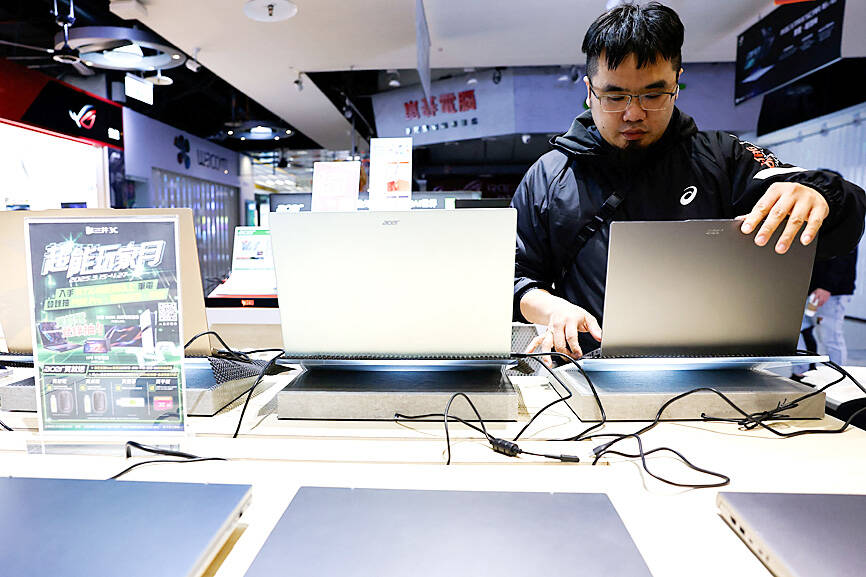Taiwanese exporters cannot claim that components in their products made with US technology should be exempt from US tariffs, the Office of Trade Negotiations said on Monday.
US President Donald Trump last week unveiled sweeping tariffs on countries that have large trade surpluses with the US, effective today.
The tariffs would be guided by the US federal government’s tariff document 9903.01.34, also known as the US content rule, which stipulates that products with at least 20 percent of their content made in the US can be exempt from tariffs on that content.

Photo: Ann Wang, Reuters
The US content rule has been described as a “humanitarian corridor,” as Taiwanese companies, including iPhone and MacBook manufacturers and artificial intelligence product makers, are studying the rules, hoping to secure relief from Trump’s tariffs.
One possibility is that components or assemblies using US technology could be tariff-exempt as “US content,” but the trade office said the content rule does not apply to technology.
For hardware, Taiwanese exporters need to provide documents to prove the US origin of the components when they declare their products at US customs, it said.
For example, even if 20 percent of a foreign product’s content was made in the US, the remaining 80 percent of the product value made abroad would still be subject to import duties, the office said.
That is, a Taiwan-made product valued at US$100 with US$20 worth of components made in the US would be taxed based on the remaining value of US$80, the office said.
Taiwan is not expected to benefit much from the US content rule, as only a small number of Taiwanese firms buy components from US suppliers and use them in products resold to the US market, the office said.
For the many Taiwanese artificial intelligence server makers that have moved production to Mexico over the past few years hoping to capitalize on the North American free market, these suppliers would still need to prove that the components they use were made in the US to get tariff exemptions, it said.
How US content is calculated would be up to US customs’ assessments, it said.
In related news, the American Chamber of Commerce (AmCham) in Taiwan called for exemption from the 32 percent US tariffs on Taiwanese goods.
The US’ action “could jeopardize the stability and trust underpinning the US-Taiwan relationship,” AmCham Taiwan said in a statement, calling on Washington and Taipei to accelerate talks on the issue.
AmCham Taiwan chairman Dan Silver expressed support for President William Lai’s (賴清德) reaffirmation of Taiwan’s commitment to the bilateral partnership with the US, including his call for reciprocal tariff reductions and greater market alignment.
“Taiwan has long acted in good faith to address trade imbalances and remains a reliable partner to the United States,” Silver said in the statement.

CAUTIOUS RECOVERY: While the manufacturing sector returned to growth amid the US-China trade truce, firms remain wary as uncertainty clouds the outlook, the CIER said The local manufacturing sector returned to expansion last month, as the official purchasing managers’ index (PMI) rose 2.1 points to 51.0, driven by a temporary easing in US-China trade tensions, the Chung-Hua Institution for Economic Research (CIER, 中華經濟研究院) said yesterday. The PMI gauges the health of the manufacturing industry, with readings above 50 indicating expansion and those below 50 signaling contraction. “Firms are not as pessimistic as they were in April, but they remain far from optimistic,” CIER president Lien Hsien-ming (連賢明) said at a news conference. The full impact of US tariff decisions is unlikely to become clear until later this month

With an approval rating of just two percent, Peruvian President Dina Boluarte might be the world’s most unpopular leader, according to pollsters. Protests greeted her rise to power 29 months ago, and have marked her entire term — joined by assorted scandals, investigations, controversies and a surge in gang violence. The 63-year-old is the target of a dozen probes, including for her alleged failure to declare gifts of luxury jewels and watches, a scandal inevitably dubbed “Rolexgate.” She is also under the microscope for a two-week undeclared absence for nose surgery — which she insists was medical, not cosmetic — and is

GROWING CONCERN: Some senior Trump administration officials opposed the UAE expansion over fears that another TSMC project could jeopardize its US investment Taiwan Semiconductor Manufacturing Co (TSMC, 台積電) is evaluating building an advanced production facility in the United Arab Emirates (UAE) and has discussed the possibility with officials in US President Donald Trump’s administration, people familiar with the matter said, in a potentially major bet on the Middle East that would only come to fruition with Washington’s approval. The company has had multiple meetings in the past few months with US Special Envoy to the Middle East Steve Witkoff and officials from MGX, an influential investment vehicle overseen by the UAE president’s brother, the people said. The conversations are a continuation of talks that

CHIP DUTIES: TSMC said it voiced its concerns to Washington about tariffs, telling the US commerce department that it wants ‘fair treatment’ to protect its competitiveness Taiwan Semiconductor Manufacturing Co (TSMC, 台積電) yesterday reiterated robust business prospects for this year as strong artificial intelligence (AI) chip demand from Nvidia Corp and other customers would absorb the impacts of US tariffs. “The impact of tariffs would be indirect, as the custom tax is the importers’ responsibility, not the exporters,” TSMC chairman and chief executive officer C.C. Wei (魏哲家) said at the chipmaker’s annual shareholders’ meeting in Hsinchu City. TSMC’s business could be affected if people become reluctant to buy electronics due to inflated prices, Wei said. In addition, the chipmaker has voiced its concern to the US Department of Commerce